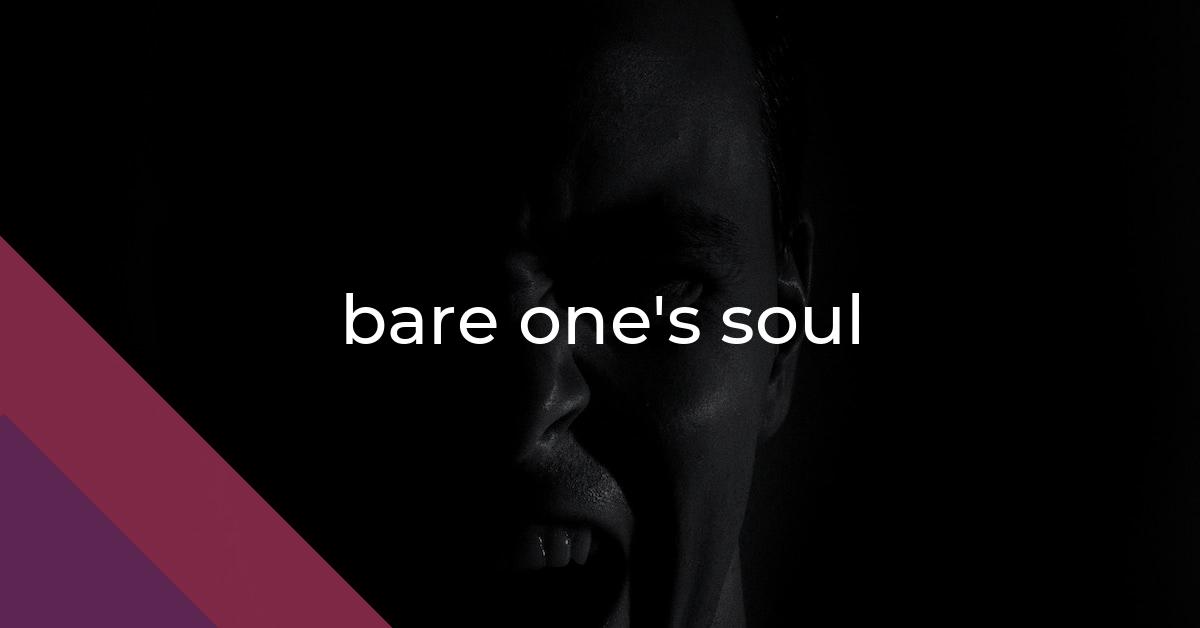bare one’s soul: Idiom Meaning and Origin
What does ‘bare one's soul’ mean?
The idiom "bare one's soul" means to reveal one's innermost thoughts, emotions, or secrets. It implies a deep level of vulnerability and openness. It is often used when someone shares their true feelings or experiences without reservation.

Idiom Explorer
The idiom "let one's hair down" means to relax or be less formal or restrained, often in a social setting.
The idiom "let it all hang out" means to be completely uninhibited or to openly express one's emotions, thoughts, or desires without holding back. It implies being authentic and unrestricted in one's behavior or communication.
The idiom "in the buff" means being completely naked, without any clothing on.
hearts on sleeves: to openly and easily show one's emotions or feelings; not hiding or containing one's emotions; to be transparent and expressive about one's emotional state.
The idiom "heart of hearts" refers to one's deepest and truest emotions or beliefs.
The idiom "have one's heart in" means to be passionately or deeply committed or invested in something or someone.
The idiom "go with one's gut" means to rely on one's intuition or instinct when making a decision, rather than using logical reasoning or analysis.
The idiom "go out on a limb" means to take a risk or to put oneself in a vulnerable position by expressing an opinion or taking an action that is not widely supported or accepted.
Unveiling the Essence
The idiom "bare one's soul" is commonly used in the English language to refer to the act of revealing one's deepest thoughts, emotions, or secrets to someone else.
The origin of this idiom can be traced back to the early 17th century, when the word "bare" was used to mean to uncover or expose. In this context, "soul" signifies the innermost essence of a person. When someone bares their soul, they are essentially stripping away any facades or pretenses to allow others to see their true selves.
This act of vulnerability creates a deeper connection and understanding between individuals. It is often used in situations where people want to establish a strong emotional bond or seek support and empathy from others.
Baring one's soul is not limited to sharing positive experiences or emotions. It can also involve revealing painful memories, regrets, or insecurities. By opening up about their vulnerabilities, individuals can find solace and validation in knowing that they are not alone in their struggles.
However, it is important to note that baring one's soul requires a certain level of trust between individuals. The act of sharing such intimate details can leave one feeling exposed and vulnerable. It is crucial to consider the context and the recipient when deciding to bare one's soul, as it can have long-lasting effects on the dynamics of relationships.
To further understand the concept of baring one's soul, it is helpful to explore related idioms that convey a similar sentiment. One such idiom is "expose oneself."
The idiom "expose oneself" carries a similar meaning to baring one's soul, as it involves revealing one's true self or inner thoughts. However, "expose oneself" is often used in a more negative or undesirable context. It can refer to unintentionally revealing something embarrassing or shameful about oneself, such as a secret or flaw. Unlike baring one's soul, which is an act of vulnerability and honesty, "expose oneself" is often seen as a mistake or a faux pas.
Another related idiom is "bare one's teeth." This idiom is often used to describe a confrontational or aggressive act, such as threatening or showing aggression. It originates from the image of an animal baring its teeth in a show of dominance or readiness to attack. While "bare one's teeth" may not have the same emotional depth as baring one's soul, it shares the theme of revealing something that is typically concealed.
Overall, the idiom "bare one's soul" represents the act of revealing one's true thoughts, emotions, and secrets in order to establish a deeper connection and foster authenticity in communication. Its origin dates back centuries, highlighting the universal human desire for emotional connection and understanding. Baring one's soul can be a cathartic experience, but it also requires trust and careful consideration of the context in which it takes place. This idiom serves as a reminder of the power of vulnerability in human relationships and the possibilities it can unlock.
Example usage
1. After years of keeping her emotions hidden, she finally decided to bare her soul to her therapist.
2. In his memoir, the author bares his soul, sharing all the intimate details of his life.
3. The singer's heartfelt performance on stage made it seem like she was baring her soul to the audience.
More "Expression" idioms



